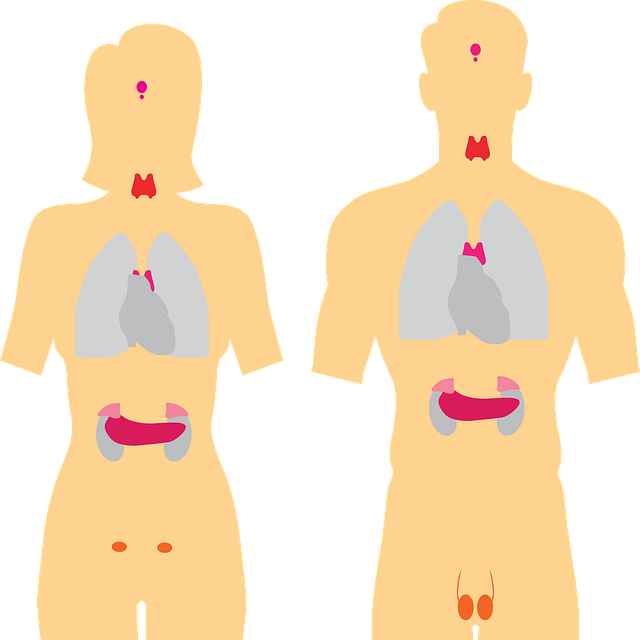What is hyperthyroidism?


General consideration;
The term hyperthyroidism, also called thyrotoxicosis, refers to the clinical manifestations associated with increased levels of Triiodothyronine(T3) and thyroxine (T4). T3 and T4 are secreted by a gland called the thyroid gland. The thyroid gland is anatomically located in the upper part of the neck below the chin. It is butterfly shape, and one can feel its movement in the neck while swallowing. The thyroid gland secret, the thyroxine hormone into the blood in T4 form which is later on converted into the active T3 form. Thyroid-stimulating hormone (TSH) regulates the function of the thyroid gland. The normal range of T3 and T4 is 90 to 210 ng/dl and 6 to 11mcg/dl respectively. These hormones perform a wide range of functions such as energy regulation, metabolism, heart rate, and muscle structure of our body. Any deviation from the above-mentioned range can cause serious complications.
This article is all about hyperthyroidism. After reading this, you will get a deep knowledge about the disease.

Hyperthyroidism is caused when thyroid cells produce excessive amounts of thyroid hormones. This can cause gastrointestinal problems and nausea as well as a weakened immune system. Thyroid glands have butterfly-shaped glands around their neck. The hormone that is produced in the blood regulates growth and metabolism. About 1 in 100 Americans with trusted sources have hyperthyroidism. This is usually seen among people aged 60 and older. Hyperthyroidism has been identified as a distinct form of hypothyroidism. “Hyper“ means a thyroid imbalance and the term “hypo” means that it's not enough.
The causes of hyperthyroidism are many and diverse, which are described below.
Graves disease
Grave disease is the most common cause of hyperthyroidism. In Europe, it is known as Basedow disease. In this condition, the thyroid hormone is affected by some autoimmune disorders, characterised by an increase in the release of thyroxine, which results in the elevation of T3 and T4 levels in the blood. The thyroid gland is enlarged in size. Antibodies have formed that bind to the TSH receptor in the thyroid cells and stimulate the gland to synthesise more thyroxine hormones. The grave disease has a 6:1 ratio in women than in men. Its onset mostly occurs at the age of 25 to 40. The majority of patients with grave diseases have a family history.
Iodine is needed for the structure of the thyroxine hormone. In presence of iodine deficiency, hyperfunctioning of the thyroid gland occurs to meet the requirements of thyroxine, which produce hyperthyroidism. It occurs in iodine-deficient Countries.
Pregnancy causes inflammation of the thyroid gland and after delivery gland release the stored hormone. It occurs in 5% of pregnant women. It is self-relieve, and no treatment is needed.

Drugs-induced Hyperthyroidism.
Anti-arrhythmic medicine such as amiodarone raised serum T3 and T4 levels and causes hyperthyroidism. In the United States, hyperthyroidism is observed due to amiodarone in about 3% of patients. Therefore, thyroxine levels should be checked in the patient using amiodarone continuously. Other drugs including iodine and alemtuzumab also cause thyrotoxicosis.
Hyperthyroidism patients have the following clinical features.
1. Heat intolerance
2. Muscles pain
3. Weakness and fatigue
4. Weight loss
5. Increase bowel movement
6. Heart problems like angina, tachycardia
7. Restlessness
8. Increase heart rate
9. Tremors of hands and fingers
10. Moist skin.
Following laboratory tests have been used for the diagnosis of hyperthyroidism
1. Serum T3 and T4 levels
Serum T3 and T4 levels are elevated in hyperthyroidism.
2. TSH level
Serum TSH level is suppressed.
3. In grave disease, anti thyroperoxidase antibodies are present in the blood
4. Thyroid ultrasound
5. MRI and CT scanning.
When to hospitalise the patient in case of hyperthyroidism?
1. Thyroid crisis
2. Atrial fibrillation with tachycardia
3. For thyroidectomy
Treatment of hyperthyroidism needs eradication of the cause of the disease.
For this purpose, both medical and surgical treatments have been used, to remove the cause of the disease.
Your doctor may prescribe medication to restore thyroid gland function and blood sugar levels. Treating the disease can prevent deteriorating health in the long term. There is not one solution for every person. Your treatment may vary depending on the severity and the causes of your hyperthyroidism. When your physician identifies a problem with your health, the patient should be treated with caution and take it into consideration.
a. Propranolol 60 mg orally twice a day.
b.Methimazole is generally used for young patients. It is given orally at a dose of 30-60 mg daily.
c. Iopanic acid is given in a dosage of 500mg twice a day.
Scientists have discovered new treatments for hyperthyroidism. A new approach to the management of thyroid cancer has been proposed by NIH. This is generally only used when drugs and medication cannot help a patient.

If the disease doesn't respond to medical treatment, the surgical option has opted to eradicate the condition. In the surgical procedure, the thyroid gland is partially or fully removed, and the procedure is called thyroidectomy. Thyroidectomy must be done with great care, as it may damage the vital structures located around the thyroid gland in the neck.
Hyperthyroidism can cause severe eye diseases such as bulging of eyes, red conjunctiva, impaired vision, and watering of the eyes.
The heart is the main organ affected by the rising level of the thyroxine hormone. High thyroxine can cause severe tachycardia, stroke, atrial fibrillation, heart failure, and angina arrhythmia. These all complications need emergency treatment.
The bone's strength depends on the amount of calcium and other minerals, which make the composition of the bones. Raised level of thyroxine hormone in the blood incorporates more and more calcium into the bone and makes it brittle. Brittleness increases the chance of fracture.
The hormonal change occurs during the first trimester of pregnancy. This change may interfere with other hormones in the blood. The thyroxine level changes during pregnancy due to the influence of human chorionic gonadotropin(HCG), the first hormone which appeared in pregnant women. The HCG hormone circulates in the blood and lowers the TSH level. However, the T3 and T4 levels come back to the normal range after the second trimester. The thyroid gland also increases in size and shape during the first trimester but subsides after delivery.
In the hyperthyroidism patient, the symptoms became suddenly severe and intensified, which results in acute clinical findings such as fever, tachycardia, vomiting, delusion, and high blood pressure. Such a condition is called thyrotoxic crisis. It is a life-threatening condition and needs hospitalisation on emergency bases. Sometimes, it occurs in trauma secondary to hyperthyroidism. Diagnose are based on clinical findings.
It is an emergency condition. Initially, the patient can be treated with propranolol, iodine, and steroids. Later on, medical or surgical treatment is required to control the elevated level of thyroxine hormone.
Hyperthyroidism is an undiagnosed disease of the thyroid gland, a gland situated behind the neck that releases hormones to regulate our body's energy consumption. In fact, a high level of thyroid hormone can cause hyperthyroidism because your thyroid is overworked and produces more thyroid hormones than your body requires. The thyroid hormones are produced from thyroxine (T4) and triiodotyroline (T3). It is important to understand how your body works. Because the imbalances in our blood can affect everything we need to know about our health and wellbeing.
It is a benign lump or growth in the thyroid tissue. Most nodules on the thyroid are noncancerous, but they increase the thyroid hormone levels and may lead to hyperthyroid disease.
Hyperthyroidism occurs when thyroid hormone is used to correct hyperthyroidism. If a dose of thyroid medicine is too high, there are signs of hyperthyroidian syndrome.
The NIH estimates that hyperthyroidism affecting more than 2 million Americans is a common problem. Although a woman can develop this condition in both males and females it is about 10x more common in males. Hyperthyroidism can cause an increase in blood pressure in children who have had anaemia or a vitamin B12 deficit, have type 1 diabetes and/or have primary adrenal insufficiency, also known as Addison's Disease.
Your doctor will take a look at your health history. The diagnosis is not based on any symptoms only as the symptoms are similar to the symptoms for other illnesses. The doctor might need several thyroid tests for confirmation of the possible cause. Due in part to hyperthyroidism, pregnant women often are screened by the doctor for thyroid symptoms. Often blood tests confirm hyperthyroid symptoms.
Thyroid disease is linked with diabetes which increases the risk for complications in diabetics who have an autoimmune hyperthyroid syndrome. Hyperthyroidism accelerates insulin metabolism and increases glucose production and absorption. Consequently, insulin resistance can increase making it more difficult for diabetics.
High thyroid hormones might cause problems in conceiving, and can affect other hormones. Prepubescent girls whose hyperthyroid glands have a tendency to miss periods and experience delayed menstruation. Women with menstruation can experience reduced menstruation and miss periods ("amenorrhea").
It's huge. Thyroid hormones have a direct impact on your heart. During hyperthyroidia, your blood pressure increases causing heart attacks or strokes. It's absolutely essential that you take everything seriously that could affect your life.

While TSH has been shown to decrease intake, it also appears that T3 does not cause dietary changes. According to how much hormone your thyroid gland produces, you might become hungry every single day and lose interest in food altogether.
The thyroid hormone regulates the temperature. Temperature can also increase with a high thyroid hormone. So your body can be more vulnerable to heat and may be more prone to perspiration 24x7.
Hyperthyroid disease can cause an overstimulation of the nerves which can hinder your sleep and cause your symptoms to worsen. You may experience night sweats or sleep a couple of times during the night.
When a hand feels unusually tight or involuntarily, it may signal you are being tested. Hyper thyroiditism may cause movement disorder or worsen tremors induced in Parkinson's disease as it progresses.
This can lead to sleep apnea as an underlying condition associated with hyperthyroidism. If you struggle to sleep at night, it can cause you to feel weak and tired at work.
An overly active thyroid affects the gastrointestinal tract and can cause up to 25% recurring visits and frequent gastrointestinal upset.
Anxiety and nervousness could be symptoms of a hyperactive thyroid gland that causes excessive stress.
Mild hypothyroidism in pregnancy is rarely an issue. But in pregnant women, hyperthyroid disease can be fatal if ignored. If you suffer hyperthyroidism, you may need to consult a doctor before getting pregnant. Keep an eye on your hyperthyroidism when you're pregnant.
The NIDDK is engaged in clinical testing for several diseases, including endocrine diseases. The trial aims to find new means of treating, preventing and reducing the risk of death and disability.
Hyperthyroidism is a condition which affects many elderly women. 2. You have hyperthyroidism more often.
At Welzo we offer Thyroid Blood Tests, click here to learn more.
Plus get the inside scoop on our latest content and updates in our monthly newsletter.